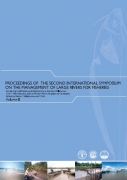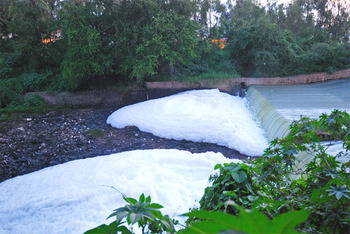/regions/political
Political
Urban Rainwater Harvesting, CSE, 22nd - 25th March, 2011, Anil Agarwal Green College, New Delhi
Posted on 05 Feb, 2011 01:19 PM Organizer: Centre for Science and Environment(CSE)
Organizer: Centre for Science and Environment(CSE)
Venue: Anil Agarwal Green College, Tughlakabad Institutional Area, New Delhi
Topics:
- Overview – Water – yesterday, today and tomorrow
- Science of rainwater harvesting
- Technology of rainwater harvesting
- Harvesting the city’s water endowment
Latest status of the storage of important reservoirs in the country - CWC - PIB Release
Posted on 05 Feb, 2011 12:17 PMOf these, as many as 36 reservoirs are having significant hydro-power benefits with installed capacities of more than 60MW each. The combined live storage in these 81 reservoirs at the beginning of monsoon, i.e. June 1, 2010 was 14% of their designed capacity and stood at 60% of designed capacity as on January 27, 2011. The present storage is 137% of last year’s storage and 145% of last 10 years average storage during the same period. Out of these 81 reservoirs there are presently 15 reservoirs where this year’s storage is less than 80 % of the average of previous 10 years and in remaining 66 reservoirs the storage is more than 80% of the average of previous 10 years.
Water job via Devex dated 4th February, 2011
Posted on 05 Feb, 2011 10:09 AMContent courtesy: Devex
- Energy & Water Analysts
Social Impact
Location: India
Last Date: 10th February, 2011
Read more
Earthcare Awards 2011 - Awards for Excellence in Climate Change Mitigation and Adaptation
Posted on 04 Feb, 2011 12:12 PM India has reflected significant leadership both through initiating on domestic commitments as part of its National Action Plan and through its willingness towards extending the Kyoto Protocol. The national mission action plan on climate change has initiated on institutional strengthening activities and increased activity at local level to tackle problems arising out of Climate Change. Indian Network for Climate Change Assessment released a major new report that provides an assessment of impact of climate change in 2030s on four key sectors in four climate sensitive regions of India.
India has reflected significant leadership both through initiating on domestic commitments as part of its National Action Plan and through its willingness towards extending the Kyoto Protocol. The national mission action plan on climate change has initiated on institutional strengthening activities and increased activity at local level to tackle problems arising out of Climate Change. Indian Network for Climate Change Assessment released a major new report that provides an assessment of impact of climate change in 2030s on four key sectors in four climate sensitive regions of India.
National Seminar on Mining of River Sand and its Impacts on the Environment, CWRDM, 18th & 19th February 2011, Kozhikode, Kerala
Posted on 04 Feb, 2011 11:28 AMTheme: Adverse impacts of uncontrolled sand mining in the rivers
Organizer: Center for Water Resources Development and Management (CWRDM)
Venue: Kozhikode, Kerala
Wetlands (Conservation and Management) Rules 2010 - Welcome, but a lost opportunity - Press release by SANDRP
Posted on 04 Feb, 2011 10:33 AMOn the occasion of the World Wetlands Day 2011, while we welcome the notification of Wetland (Conservation and Management) rules 2010 by the Union Ministry of Env
Proceedings of the second international symposium on the management of large rivers for fisheries by FAO and Mekong River Commission
Posted on 03 Feb, 2011 07:55 PM The second international symposium on the management of large rivers for fisheries was held by the Food and Agriculture Organisation of the United Nations (FAO) and Mekong River Commission on 11 - 14 February 2003 in Phnom Penh, Kingdom of Cambodia. It had three primary objectives: (a) To provide a forum to review and synthesise the latest information on large rivers; (b) To raise the political, public and scientific awareness of the importance of river systems, the living aquatic resources they support and the people that depend on them; and (c) To contribute to better management, conservation and restoration of the living aquatic resources of large rivers.
The second international symposium on the management of large rivers for fisheries was held by the Food and Agriculture Organisation of the United Nations (FAO) and Mekong River Commission on 11 - 14 February 2003 in Phnom Penh, Kingdom of Cambodia. It had three primary objectives: (a) To provide a forum to review and synthesise the latest information on large rivers; (b) To raise the political, public and scientific awareness of the importance of river systems, the living aquatic resources they support and the people that depend on them; and (c) To contribute to better management, conservation and restoration of the living aquatic resources of large rivers.
The symposium was organised in six sessions:
Session 1: Status of rivers
Session 2: Value of river fisheries
Session 3: Fisheries ecology and conservation
Session 4: Management of river fisheries
Session 5: Statistics and information
Session 6: Synthesis
It came up with the following recommendations for action -
- Improve the valuation of living river resources in order to contribute to equitable and sustainable management of fishery resources and properly place the fishery in the context of the other uses of rivers.
- Direct greater effort to better understanding the social and economic aspects of fisheries to support policy and management priorities; livelihood approaches will be a valuable tool.
- Communicate and engage with environment and water resources managers within the context of multi-use of water in order to accurately assess impacts and to sustain the benefits of river fisheries in an equitable manner.
- Develop processes that facilitate the users and beneficiaries of the fishery resource to assume greater control of its management.
- Establish appropriate mechanisms at national and basin level to enable negotiation for the needs of communities dependent upon the living aquatic resources. In particular further regulations need to be elaborated to protect general ecosystem function and provide for environmental flows.
- Use instruments such as the freshwater eco-regions approach, the Ramsar Convention and the guidelines for water allocation suggested by the World Commission on Dams, to enhance planning for conservation and sustainable use of river habitats.
- Incorporate ecological flow requirements of river-floodplain systems into development plans and impact assessments that affect river flows, taking into account the seasonality of the system and the environmental cues needed by the fish for migration and reproduction.
- Rehabilitate degraded ecosystems wherever possible. Prioritize schemes that ensure connectivity and protection of critical habitats.
Run for Bellandur Lake, 6th February 2011, Bangalore
Posted on 03 Feb, 2011 03:26 PM Organizers: Group of Environmental and Social Activists
Organizers: Group of Environmental and Social Activists
Venue: Bangalore
Description:
This run is a demand from citizens for government action and it is also intended to spread awareness of the situation.
This event is for all of us in Bangalore, our children, our health and well being. We can get back our wonderful lakes, not to mention valuable drinking water for the future.